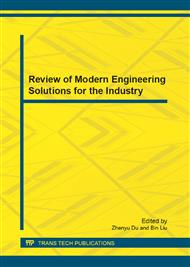p.438
p.445
p.449
p.454
p.459
p.464
p.469
p.474
p.479
Research on Strategies of Pricing and Coordinating in Reverse Supply Chain for Remanufacturing
Abstract:
Based on the remanufacturing reverse supply chain consisted of single retailer and single manufacturer, this paper applied game theory to establish a non-cooperative game and cooperative game model and got optimal pricing strategy by solving this two kinds of game model. By comparing the total profits of reverse supply chain in every game model, a conclusion was draw that non-cooperative game model led to profit loss and double marginal effect. In order to solve the problems, revenue sharing contract was used to coordinate the reverse supply chain and coordinating strategy was got. The results show that revenue sharing contract can increase the total profits of the reverse supply chain, while at the same time meet the respective interests of retailer and manufacturer and coordinate the reverse supply chain.
Info:
Periodical:
Pages:
459-463
DOI:
Citation:
Online since:
October 2012
Authors:
Keywords:
Price:
Сopyright:
© 2012 Trans Tech Publications Ltd. All Rights Reserved
Share:
Citation:


